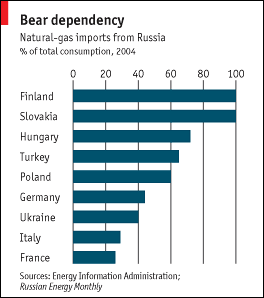
Ο "Μόσκοβος" προφανώς και δεν τελείωσε την παρτίδα του με τη Δύση. Το Κρεμλίνο και η ελεγχόμενη απο την ηγεσία του Gazprom δεν έχει ανοίξει -κι ούτε πρόκειται να τα ανοίξει ιδιαίτερα σήμερα που κυριαρχεί το ζήτημα του Ιράν- τα δυνατά του χαρτιά. Οι "άσσοι" παραμένουν καλά κρυμμένοι, ως εφεδρεία στην τελική έφοδο...Ένα σχετικό άρθρο δημοσιευμένο στο τελευταίο τεύχος του περιοδικού The Economist τροφοδοτεί με ενδιαφέροντα επιχειρήματα τον προβληματισμό΄γύρω απο τις επιλογές και τις φιλοδοξίες του "Μόσκοβου".
Customer relations, Gazprom-style
(Apr 27th 2006/From The Economist print edition)
THREATENING customers who speak out of turn smacks more of a protection racket than civilised commerce. Yet Gazprom, Russia's state-controlled gas giant, seemed to do just that last week. Alexei Miller, Gazprom's chief executive, apparently linked a putative thwarting of his company's European expansion with a hint that exports could be redirected, say, to China. Misunderstanding? Hardly: this bullying tone seems to be official policy. Indeed, Vladimir Putin, Russia's president, repeated the threat on April 26th, when he spoke of “unfair competition in world markets”.
At the Russian economic forum in London this week, Alexander Medvedev, one of Mr Miller's deputies, snubbed Alan Johnson, Britain's trade and industry minister. Mr Johnson had suggested that Russia should ratify the Energy Charter Treaty (meant to ensure open and competitive energy markets). Peeved by European talk of alternative energy sources, Mr Medvedev declared the treaty “still-born”. Not many Russian bigwigs appeared in London: Igor Shuvalov, a presidential aide who did, said his colleagues think such pow-wows should be held in Russia (rumour had it they also feared meeting Mikhail Kasyanov, a presidential aspirant who wasn't there either). While denying that Gazprom had made threats, Mr Shuvalov affirmed the principle of “reciprocity”.
What “reciprocity” means is that Gazprom wants to buy more “downstream” assets in European countries—pipelines, distribution firms and so on—such as Britain's Centrica. The Financial Times reported recently that British officials had considered changing the law to block any Gazprom takeover of Centrica. The FT later backtracked on its story, but the Russians were already cross. Mr Medvedev admitted in London that Centrica was one among many “potential acquisition targets” (though he stressed no move was imminent). Meanwhile, Condoleezza Rice, America's secretary of state, issued another warning this week against over-reliance on Russian energy. And Transneft, Russia's oil-pipeline monopoly, predicted the construction of its new Asian pipelines would squeeze westward oil supplies.
Gazprom's position is not entirely consistent, to put it mildly. The Russians sometimes argue that, because foreigners can now buy Gazprom shares, their gas market has been liberalised. But whereas Gazprom demands unfettered access to European assets, access for foreign companies to hydrocarbon deposits in Russia is being circumscribed by a new law. And Gazprom has a monopoly on all Russian gas exports.
Gazprom needs European revenues too badly to think about switching off Europe's gas. Yet the Europeans know Gazprom's decisions can be governed by non-commercial motives—only some of them political. Another rumour this week was that RosUkrEnergo, a shady gas-trading intermediary part-owned by Gazprom, is being investigated by America's Justice Department (a Russian newspaper named two Ukrainian businessmen allegedly involved in it). Still, Gazprom and the Kremlin remain convinced they hold all the best cards.


Δεν υπάρχουν σχόλια:
Δημοσίευση σχολίου